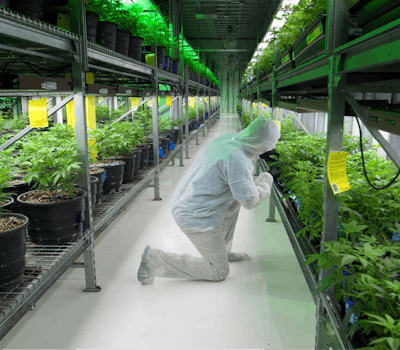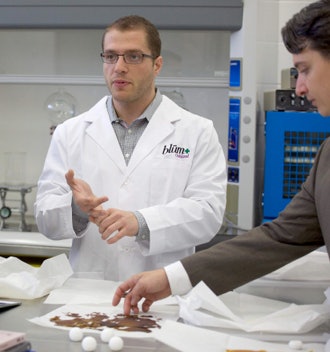Commercial cannabis lab testing has come a long way as the trickle of states authorizing medical or recreational markets becomes a steady stream. And with new rules taking effect, insiders expect the testing sector to balloon alongside the core industry it supports.
The sector has found its footing, people who operate and utilize labs say, as an increasingly robust framework for testing is established in states across the country.
In the past year, Colorado labs have helped carry out Governor John Hickenlooper’s zero-tolerance policy for pesticides as medical growers prepare for mandatory product testing.
In Washington, where one lab notoriously gave off-the-charts THC readouts, new rules require that labs participate in proficiency testing, a step toward ensuring reliability.
Nevada’s stringent testing rules — requiring every 5 lbs. of flower to be tested and mandatory terpenes testing — are being watched with interest by neighbors.
And in California, the testing sector is expected to explode when legislation passed last year regulating the state’s medical cannabis industry takes full effect.
“The industry believes that California represents 50 percent of the U.S. cannabis market, and that less than 5 percent of the [current California] market currently tests,” says JmîchaeÎe Keller, president and CEO of Steep Hill Labs, a leading lab with locations in Berkeley, Seattle and Albuquerque.

It’s unclear if existing labs will be able to handle the influx when 5 percent becomes 100 percent. But they have time to prepare. Testing isn’t required to be in place until January 2018.
Derek Peterson, CEO of Terra Tech, which grows and sells medical marijuana in Oakland, Calif., and Las Vegas, says he sees California’s lab sector as a potential opportunity for savvy businessmen.
“We wait three to five days sometimes to get test results back, and that’s with the industry not being mandated, so I think we’re going to hit a bottleneck,” he says. “I’m hoping entrepreneurs wake up and say, ‘I know owning a dispensary sounds attractive and owning cultivation sounds attractive, but here’s a hole in the business that people aren’t paying a lot of attention to where there’s significant economic potential.”
Peterson says his company tests partially “for selfish reasons” to protect against reputational risk, but he believes about 90 percent of his competitors aren’t taking on the voluntary cost.
He says he’s worked with many labs and that over the years, “the testing industry has certainly matured.”
“It has a distance to go to get to the clinical level of other testing, but it will get there because there are people with significant pedigrees, and capital is starting to flow into the industry,” he says.
Opportunity knocks not only in California. Steep Hill, for example, has licensed its name for testing operations in Alaska, Colorado, Nevada and Maryland.
Werc Shop co-founder Jeffrey Raber, a prominent testing expert, says his lab has near-term plans to expand into Oregon after closing a Southern California location last year when Pasadena police arrested him after finding hash oil, production of which is legally dicey in the state.

But Raber, whose lab currently operates in Washington, expects to reopen operations in California in the future. “We are still working on re-establishing our testing efforts under the new laws,” he says. “We will only operate legally under the new laws and had to find a new city to do so.”
Raber says the anticipated boom in California testing still is somewhat far-off, as draft rules have not been formulated, and it remains unclear what the exact testing parameters will be.
The arrest of Raber, against whom charges have not been filed, was not the only shock to the lab sector last year. Months later in November, a well-respected leader of Colorado’s testing community, CannLabs, closed down after going public, though the exact circumstances around the closure are unclear.

Medicine Man
Jeannine Machon, co-owner of Colorado’s CMT Laboratories, says she doubts many other labs are considering going public and that the shock has made fellow owners who respected CannLabs cautious about potential business deals.
CannLabs went under about the time mandatory microbial testing took effect, Machon recalls, meaning for remaining labs “it was a tsunami hitting the beach,” resulting in much more business and a deluge of work.
Machon serves on a state advisory board on pesticide use in cannabis and has had a front-row seat as Hickenlooper’s no-pesticides mandate has been implemented, a policy scoffed at by some growers who say people regularly eat a small amounts of pesticides on grocery store produce.

Jeremy Raber
Hickenlooper’s order, handed down in November 2015, means theoretically that cultivators cannot have any trace of pesticides that aren’t expressly allowed, but Machon says the science isn’t so simple.
“Zero is scientifically impossible,” she says. “We are trying to measure these pesticides in parts per billion and that’s as close as anyone can get, except for non-scientists who just write zero on a piece of paper.”
Machon says she believes a near-zero solution will be offered by the working group, which meets every two or three weeks, and that “I believe the governor will understand that what we come up with is logically zero.”

Jeannine Machon
She adds: “At this point ..., anyone out here using a product not on the [state department of agriculture’s] list of acceptable pesticides is an idiot and deserves to get busted.”
Still, Machon says the ban has resulted in growers using less-effective products and that “we’ve seen potencies go down and the grows get a little more stressed when you have to be a little more aggressive,” by treating plants more often.

Steven Bollman
Colorado’s mandate that medical marijuana be lab-tested was slated to take effect in July, but the state’s Marijuana Enforcement Division (MED) postponed implementation as it proceeds with proficiency testing of labs to license them for testing medical products.
Machon says potency testing appears to have been kicked to August, and other forms of testing later, but the MED has not officially said so.
Reliability on the Rise
Proficiency testing aims to assure labs give accurate readouts. Some labs voluntarily participate in group “ring tests” to tighten results after wide variations among labs in the past undermined credibility.
Sampling plays some role in varying results, but to improve accuracy, labs recalibrate expensive, complicated machines. There’s a general consensus among labs and their customers that results are becoming more reliable.
Andy Williams, co-owner of Medicine Man, a large Colorado cultivation and dispensary business serving recreational and medical users, says years ago he scratched his head at lab variations.
Once, he says, he sent what he believed to be two near-identical samples to different labs and got different results. Another time, he cut a bud sample in two and sent it to the same lab for testing. The results “raised our eyebrows,” he says.
But he says, “The differences in testing is getting better,” as variances have narrowed.
Williams says he used testing to ensure his 40,000-square-foot cultivation facility wasn’t affected by mold, and says he sought pesticide testing before it was required, to stay ahead of the curve.

“Testing has helped the industry give consumers a sense of safety, one more distinction from the black market,” he says. “It’s also been helpful on advertising. Customers can look for potency high or low.”
Medicine Man has two dispensaries and is preparing to open a third storefront using the single grow site.
“We’re going to double our production in the same amount of space,” Williams says. “We’ve run experiments like any manufacturing facility,” fiddling with nutrients, mediums and using test rooms to try out innovations. “Testing is a big part of learning how to do things better,” he says. “We test our ingredients because everything is not always listed on the label.”
Behind the scenes, labs have worked intensely among themselves to tighten results. The Emerald Test, a collaborative lab endeavor, has led the way to help improve cannabis testing. The test, offered twice a year, sends a sample to a large number of labs, who then are informed how their results match up against other facilities.
Machon says it’s unclear what the future holds. But she’s optimistic for the testing sector as professionalism, sound science and expanded requirements take hold.
“If you go back two years ago, there was a scientific conference put on by Emerald Scientific with 80 people,” she says. “The Emerald Conference this year had hundreds and hundreds.”
On the finer points, there’s less certainty. Are Nevada’s touted strictures wise or overkill? Is Colorado allowance of testing gaps for growers and edible manufacturers who establish process validation a good idea? Machon say she doesn’t know.
“This is still, for everyone, the grand experiment. Who’s to say who’s right and who’s wrong?”














